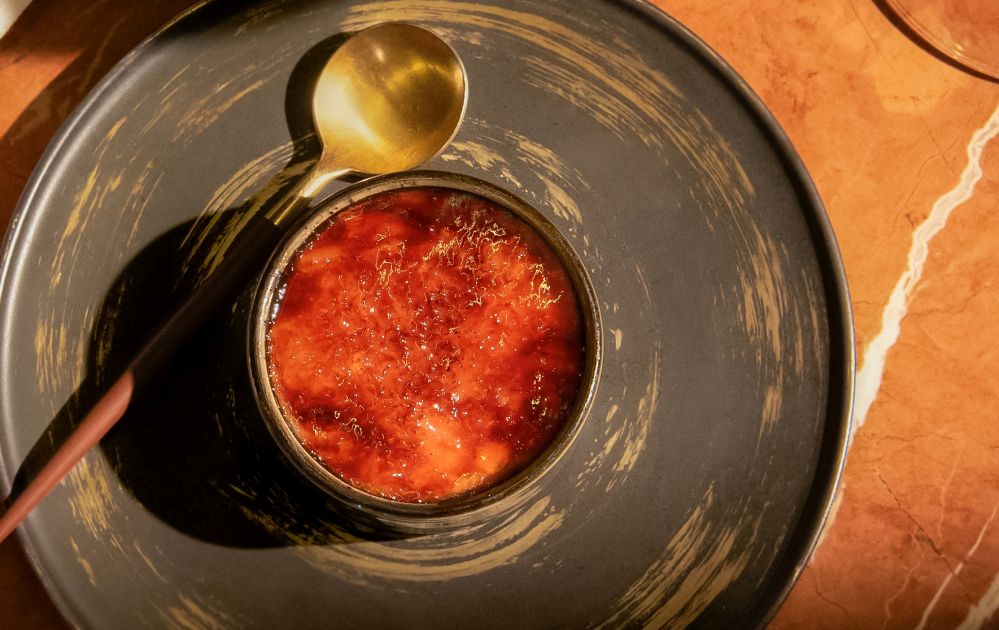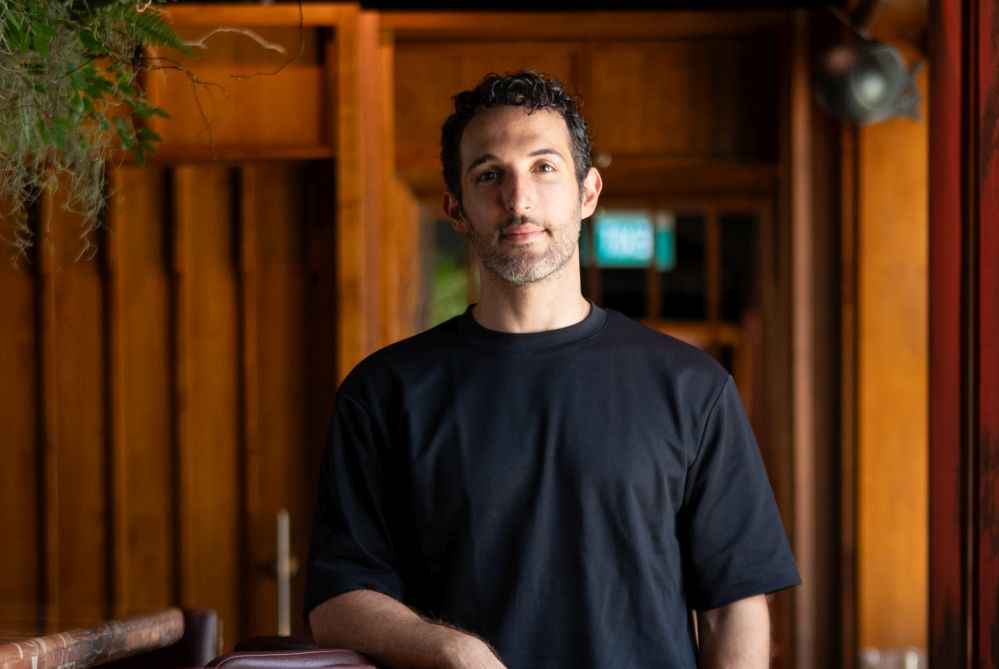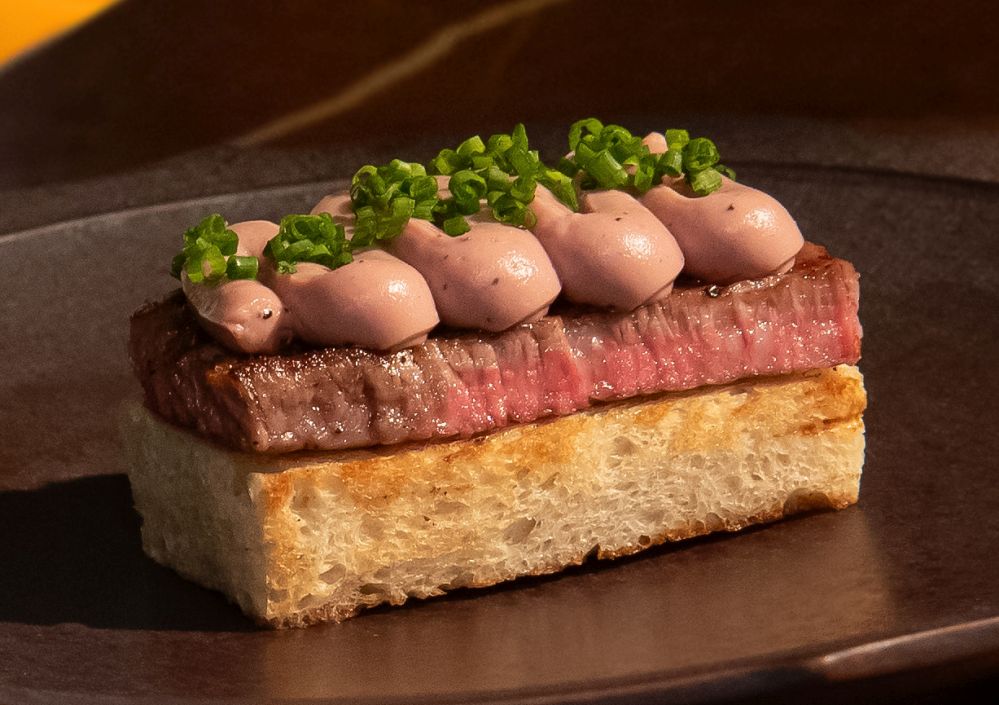Sydney-based Vow has become the third startup* (after UPSIDE FOODS and GOOD Meat) to introduce cultivated meat to the market after securing the green light from regulators in Singapore. But it’s not starting with chicken nuggets.
Vow’s first product—‘Quailia’ under the ‘Forged Parfait’ brand—is a “meat we haven’t seen on our plates before… a subspecies of Japanese quail offering a rich umami flavor with a weightless, melt-in-your-mouth quality,” says Vow, which is debuting the delicacy at the exclusive Mandala Club on April 12 before rolling it out to more high-end restaurants in Singapore in the coming months.
Vow then plans to launch two other SKUs using Japanese quail cells under the Forged brand in Singapore later this year, cofounder and CEO George Peppou told AgFunderNews.
“And then, if all goes smoothly, there’ll be another geography which will open up very shortly after Singapore, and then we’re hoping for approval in Australia, which is on track for between October and mid-November. So by the end of this year, we’re hoping to be in three geographies with at least three products under the Forged brand.”
Why start with a low-value, high-volume product before you have meaningful scale?
While you aren’t going to displace industrial animal agriculture with novelties served in high-end restaurants, it’s a more logical starting point for a cultivated meat startup with limited scale than chicken nuggets, said Peppou, who co-founded Vow in 2019 with Tim Noakesmith, opened a pilot plant in Sydney in 2022 featuring a 2,000-liter bioreactor, and is now operating much larger bioreactors at an adjacent site.
“A key part of the proposition to fine dining chefs was that they can serve something that no one else has and no one else can have, because we just invented it.”
Meanwhile, if you’re growing meat from cells in a bioreactor, rather than raising living breathing animals, there may not be a meaningful difference between the cost structures of growing heritage breeds or high-value meats currently considered to be delicacies and the mass market products that currently dominate the meat supply, said Peppou, who has raised $56 million to date from backers including Blackbird and Prosperity7 Ventures.
Aside from the fact that chicken is a high-volume, low-value meat, which makes matching it on cost a huge challenge for cultivated meat companies before they have significant scale, it also feels like a failure of imagination, he observed.
Vow is not attempting to precisely replicate every element of animal tissue
Peppou is upfront about the fact that Vow’s first products are not structured products in which cells have differentiated and matured into recognizable muscle tissue. Instead, the aim is to grow and proliferate undifferentiated cells in a bioreactor as fast and cost-effectively as possible.
According to Vow’s regulatory filings with Food Standards Australia New Zealand (FSANZ), it is using fibroblasts isolated from embryos of Coturnix japonica (Japanese quail), that are immortalized as embryonic fibroblast cell lines such that they can proliferate almost indefinitely under the right conditions in suspension (ie. they don’t have adhere to anything). According to Peppou, Vow achieved this capability through selection of spontaneously immortalized cells rather than using genetic engineering.
While differentiated cells have different qualities, he said, “It didn’t make sense to add all that cost and complexity for a first-generation product when we could deliver something fast to the market at lower cost with a far simpler production process. Ultimately, we are doing heaps of work on differentiation and tissue engineering and more sophisticated two step processes, but either way, you still require an initial proliferation phase [to grow cell biomass], and you have to be good at growing lots of cells.”
He added: “I’ve always said that my goal is to make unparalleled, distinctive premium novel foods and experiences that are offering a compelling value proposition to the consumer, not to perfectly replicate every element of animal tissue.
“Some companies have set as their goal that they want to match the nutritional properties of a beef burger, in which case you do need differentiated bovine muscle to do that. But that is not our goal for quite some time, or potentially ever.”
That said, for Vow’s second generation of products, Peppou is looking at “quality and quantity of protein, quality and quantity of iron and bioavailability of iron, quality, quantity and availability of vitamin B’s A’s etc.”

De-risking cultivated meat
Asked about Vow’s roadmap, he said: “Forged is a luxury brand, and I don’t expect it will ever be huge. It serves a purpose which is to offer consumers a unique experience that no one else can have.
“But we’re already developing products and brands for those nutrition-led, second-generation products which I do believe will drive a significant volume and do have a huge market. And then ultimately, there’s a bunch of mass market opportunities for products sold purely as a brand, not an animal. But we can’t get there overnight, and rushing towards that mass market proposition would require billions of dollars of very patient capital.”
In contrast, he said, “If we can build a luxury business and use at least some of that cash flow to subsidize the cost of building a nutrition driven business, I think that’s a much better way to come down market and to incrementally de-risk that big long term opportunity.”
Nascent industry has ‘massively overpromised and underdelivered’
Echoing comments recently made by Aleph Farms CEO Didier Toubia about the cultivated meat industry’s failure to management expectations, some startups have arguably “massively over promised and under delivered,” said Peppou, much like some high-profile plant-based meat brands. And this has driven increasingly negative media and investor sentiment.
That said, “there was also a lot of breathless media coverage in the early days that repeated companies’ claims without much scrutiny.”
But while funding into the segment fell 78% last year according to AgFunder data, “there is still a lot of capital out there both in generalist and specialist investors and infrastructure investors,” claimed Peppou, “as long as you can show a credible business plan.”
He added: “Talking to one specialist investor recently, they essentially said for us to even contemplate an investment, you need to show that you can produce something at scale at a cost structure that makes sense and have a market that’s willing to pay more than that cost structure either now or in the very near future. We believe we can tick those boxes.”
Do consumers actually want cultivated meat?
But what ultimately, is the consumer appeal of cultivated meat? Have players in this segment simply assumed that consumers will buy into it because it’s more ‘meaty’ than plant-based meat?
According to Peppou: “I believe the first consumer driver is status and exclusivity which comes from truly distinctive food experiences, but it’s also about what’s driving chefs and restaurants. We’re allowing chefs to put something unique on a plate for the first time. And for consumers, the Forged brand presents a rare opportunity to have foods you can’t get anywhere else.”

The unit economics of cultivated meat
Asked about scaling up, he said Vow would be laying out more details about its capabilities at its larger-scale plant (‘factory two’) later in the year, but he said it would “be a stretch” to make profitable products from a 2,000-L bioreactor.
“As soon as you get up into tens of thousands of liters,” the numbers start to add up, he said, noting that Vow’s cell lines are “not very growth factor dependent” and do not require albumin, a protein widely used in serum-free media formulations.
In general, he said, “Our overall company philosophy has always been there’s going to be a cost curve, so how do we monetize as we come down that cost curve so we’re not dependent on reaching that asymptote before we have a business, because I don’t think there’s any credible pathway to capitalize to that threshold.
“So that means for us right now with the growth media where it is, the growth factors where they are, without process scale and reliability, and our very crude levels of factory floor automation, we still know that we can achieve unit economics that allow us to achieve a positive margin as a premium product.”
‘Gold-plated bioreactors’
He added: “As long as you have a credible way of achieving a significant premium above commodity for a period of time, all of the requirements for scale in the supply chain are already solved.
“Where I think a lot of the costs have been drastically inflated, has been some of the well capitalized companies going straight to these engineering design construct firms that predominantly work in the pharmaceutical industry, and ending up with these ludicrously gold-plated bio reactors and associated processing equipment.”
By working with players with experience in other industries, Vow has been able to “really reduce the risk, reduce the capex, and reduce the payback time” on equipment, he claimed.
“And if you can couple that with a higher priced product, you can reduce that payback time further, so each incremental line you add then gets into that sweet spot of a two to three year payback period.”
*Editor’s note: Israeli startup Aleph Farms recently secured a ‘no questions‘ letter from the Israeli Ministry of Health regarding the safety of its cell-cultured beef, but has not yet launched products there.





